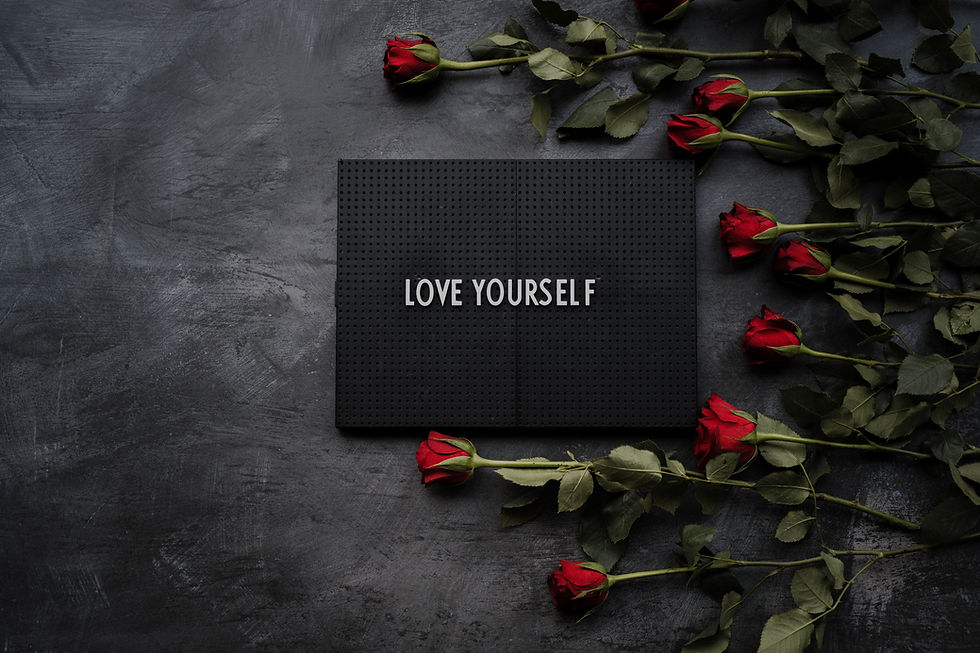How To Be Your Own Best Friend?
- TJ Joshi

- May 13, 2023
- 9 min read
Being a good friend means being supportive, kind, and understanding. It's about knowing when to listen, when to speak up, and when to be there for someone silently. Do you recall a person who’s been with you through thick and thin and never left your side?
It's YOU. You are the only person who’s been with you all along through joy and sadness. You are sure to have yourself for the rest of your life, so make the most out of it.
Being your own best friend is a concept rooted in self-love and self-care. It means developing a deep and compassionate relationship with yourself, prioritizing your well-being, and treating yourself with kindness and understanding.

In this guide, we will explore the importance of self-friendship and how it can transform your life. We will also look at some practical tips and tactics to help you promote self-love.
By embracing self-friendship, you can embark on a journey of personal growth, inner fulfillment, and lasting happiness. Let's discover how to be your own best friend together.
Understanding Self-Friendship
To truly be your own best friend, it's essential to understand the meaning behind this concept. Being your best friend involves treating yourself with the same kindness, support, and compassion you would offer a close friend. It means being aware of your needs, appreciating your strengths, and providing comfort during difficult moments.
Let us look at the benefits of self-friendship reveals how it can positively impact your life:
Increased self-esteem and confidence: You need to be your own hero. By practicing self-friendship, you develop a strong sense of self-worth and belief in your abilities. You become your own cheerleader, acknowledging your accomplishments and recognizing your unique qualities. For example, instead of dwelling on a mistake, you encourage yourself and remind yourself of past achievements demonstrating your capabilities.
Greater resilience and self-reliance: Building a supportive relationship with yourself fosters stability and self-reliance. You develop an inner strength that helps you navigate setbacks and bounce back from adversity. When faced with challenges, you can rely on your self-friendship to provide guidance, motivation, and the belief that you have the strength to overcome obstacles.
Improved mental and emotional health: Self-friendship is crucial in nourishing your mental and emotional well-being. When you treat yourself with kindness and compassion, you cultivate a positive self-image and inner harmony. This can lead to reduced stress, increased happiness, and a greater sense of fulfilment in life. For instance, you offer gentle self-care activities during difficult times, such as taking a soothing bath or engaging in a favorite hobby, to promote emotional well-being.
By embracing self-friendship and reaping these benefits, you can foster a deep connection with yourself, enhancing your overall quality of life and empowering yourself to face any challenges that come your way.

Developing a Positive Self-Image
Creating a positive self-image is crucial to being your best friend. It involves cultivating a healthy perception of yourself and nurturing self-acceptance. Here are some practical tips to help you on this journey:
Practice self-compassion and forgiveness: If you want to be your own best friend, full fill your needs. Treat yourself with compassion. Treat yourself with kindness and understanding, just like a dear friend. Be gentle with yourself when facing challenges or setbacks. Practice self-forgiveness, recognizing that everyone makes mistakes and that personal growth comes from learning and moving forward.
Focus on your strengths and positive qualities: Shift your attention to your strengths and positive qualities. Acknowledge your accomplishments, skills, and unique attributes. Celebrate your achievements, no matter how small they may seem. Recognize the value you bring to the world and your positive impact on others.
Accept your imperfections and embrace your uniqueness: Embrace that being human means being imperfect. Embrace your flaws and quirks as part of what makes you unique.
Appreciate that your imperfections contribute to your individuality and personal growth. Remember that nobody is perfect, which makes us all beautifully human.
We have to learn to be our own best friends because we fall too easily into the trap of being our own worst enemies. ~Roderick Thorp
Things to remember:
Avoiding negative self-talk and self-criticism is vital in nurturing self-friendship. Negative self-talk can undermine your self-esteem and hinder your progress. Replace self-critical thoughts with positive and empowering affirmations.
Challenge negative beliefs about yourself and reframe them more compassionately and supportably.
By practicing self-compassion, focusing on your strengths, accepting your imperfections, and avoiding negative self-talk, you can develop a positive self-image that lays the foundation for a strong and supportive self-friendship.
Remember, being your best friend is an ongoing journey of self-discovery and self-care. Treat yourself with love and kindness, and watch as your self-image flourishes.
Practicing Self-Care and Self-Love
If you make friends with yourself, you'll never be alone. -Maxwell Maltz
Practicing self-care and self-love is a powerful way to nurture your relationship with yourself and cultivate a healthy and fulfilling life. Here are some practical tips to help you in this journey:
Prioritise your physical and mental health: Take care of your body and mind by prioritising your well-being. Get enough sleep, eat nutritious meals, and engage in regular exercise. Make time for activities that promote relaxation and reduce stress, such as meditation, yoga, or spending time in nature. Taking care of your physical and mental health shows self-respect and allows you to show up fully in all areas of your life.
Set boundaries and say no when necessary: In some cultures, taking care of our own needs can be seen as selfish or self-centered. This belief can block us from becoming our own best friend. Establishing limitations is essential to self-care and self-love. Learn to recognize your limits and prioritize your own needs. It's okay to say no to commitments or requests that don't align with your values or drain your energy. Setting boundaries allows you to create space for self-care and maintain a healthy balance in your life.
Engage in activities that bring you joy and fulfillment: Make time for activities that bring you joy and fulfill your passions. Engaging in hobbies, pursuing creative outlets, or spending time with loved ones can nourish your soul and enhance your sense of self-worth. Allow yourself the pleasure of doing things that make you happy and ignite your inner spark.

By practicing self-care and self-love, you demonstrate self-respect and nurture your relationship with yourself. Remember, being your best friend means prioritising your well-being, setting boundaries, and engaging in activities that nourish your soul.
Building a Supportive Inner Voice
Developing a supportive inner voice is crucial for nurturing self-love and building a positive self-image. Here are some tips to help you cultivate a supportive inner voice:
Challenge negative self-talk and replace it with positive affirmations: Pay attention to the thoughts and self-talk patterns that undermine your self-esteem. When you catch yourself engaging in negative self-talk, challenge those thoughts by asking yourself if they are based on reality or self-limiting beliefs. Replace negative thoughts with positive affirmations that uplift and encourage you.
Practice gratitude and focus on the good in your life: You should start focusing on your life and well-being. Cultivating gratitude can transform your perspective and enhance your self-talk. Regularly acknowledge and appreciate the positive aspects of your life. By focusing on gratitude, you shift your attention away from self-criticism and embrace a more positive outlook.
Visualise your ideal self and strive towards it: Create a clear vision of the person you aspire to be. Imagine the qualities, values, and achievements you want to embody. Use this vision as a guide and motivation to make choices aligned with your ideal self. You build confidence and reinforce a supportive inner voice by working towards your aspirations.
If you want to know how to be your own best friend, then remember; that the impact of self-talk on self-esteem and self-confidence is profound. Negative self-talk can destroy your self-esteem, create self-doubt, and block personal growth. Conversely, cultivating a supportive inner voice can boost self-confidence, enhance self-esteem, and empower you to overcome challenges.
You can gradually shift towards a more supportive inner voice by consciously challenging negative self-talk, practicing gratitude, and visualising your ideal self. Remember, the way you speak to yourself matters. Be kind, compassionate, and encouraging in your self-talk, and watch how it transforms your perception of yourself and influences your overall well-being.
Cultivating Self-Compassion and Forgiveness
Self-compassion and forgiveness are essential components of self-friendship. They allow us to treat ourselves with kindness, understanding, and acceptance, fostering a healthier relationship with ourselves. Here's why self-compassion and forgiveness are crucial in self-friendship:
Importance of self-compassion and forgiveness: Self-compassion involves extending the same compassion, understanding, and support to ourselves that we would offer to a dear friend facing a difficult situation. It helps us embrace our imperfections, acknowledge our struggles, and practice self-care. Conversely, forgiveness releases us from the burden of holding onto grudges or self-blame, promoting emotional healing and growth.
Practical tips for practicing self-compassion and forgiveness:
Practice mindfulness and self-awareness: Cultivate the ability to observe your thoughts and emotions without judgment. Mindfulness allows you to become aware of self-critical or self-judgmental thoughts and redirect them with self-compassion.
Reframe mistakes as opportunities for growth: Instead of dwelling on your mistakes, view them as valuable lessons and opportunities for personal growth. Embrace a growth mindset and recognize that making mistakes is a natural learning process.
Treat yourself with kindness and understanding: Be gentle and nurturing with yourself. Treat yourself with the same care and compassion as a loved one. Practice self-care, engage in activities that bring you joy, and prioritize your well-being.
By cultivating self-compassion and forgiveness, you create a nurturing and supportive environment within yourself. This allows you to navigate challenges more resiliently, embrace your humanity, and foster a deep sense of self-friendship.
Remember, self-compassion and forgiveness are ongoing practices that require patience and self-reflection. As you cultivate these qualities, you'll experience a profound shift in your relationship with yourself and cultivate a stronger sense of self-love and self-acceptance.
Embracing Your Authentic Self
“You are your own best friend. Never ever put yourself down.” – Paulo Coelho.
Embracing your authentic self is an integral part of self-friendship. It means accepting and celebrating who you truly are, free from the pressures of societal expectations or comparisons to others. Here's how you can embrace your authentic self:
Accept and celebrate your unique qualities and quirks: Recognize that you possess a distinct combination of traits, talents, and quirks that make you who you are. Instead of trying to conform to an ideal or fit into molds created by others, embrace your individuality. For example, if you have a quirky sense of humor, allow it to shine and express your authentic self. Celebrate the qualities that set you apart and contribute to your uniqueness.
Avoid comparing yourself to others: Comparing yourself can undermine your self-esteem and hinder self-friendship. Remember that everyone's journey is different, and each person has their strengths and weaknesses. Instead of measuring your worth against others, focus on your progress and growth. Celebrate your achievements, big or small, and acknowledge your personal development. For instance, if you see someone excelling in a particular field, rather than feeling inadequate, remind yourself of your own strengths and accomplishments in your chosen path.
Pursue your passions and interests: Embracing your authentic self involves pursuing activities that genuinely resonate with you. Engage in hobbies, interests, and passions that bring you joy and fulfillment. It could be anything from painting to playing an instrument, writing, or practicing a sport. By dedicating time to what you love, you honor your authentic self and cultivate a deeper sense of happiness and fulfillment.
Self-acceptance is a fundamental aspect of self-friendship. When you accept yourself unconditionally, you cultivate a deep sense of self-worth, self-respect, and self-love. It allows you to embrace your strengths and weaknesses without judgment, fostering a positive and nurturing relationship with yourself.
By embracing your authentic self and practicing self-acceptance, you create an empowering space within you that encourages personal growth, fulfillment, and happiness. Remember, your uniqueness is what sets you apart and makes you valuable. Embrace, celebrate, and let it guide you toward self-friendship and self-fulfillment.
Is it possible to be your own best friend?
Yes, it is possible to be your own best friend. While it may appear that being your own best friend is an unusual concept, it is based on the practice of self-love and self-care. Being your own best friend means treating yourself with kindness, compassion, and understanding, just as you would treat a close friend.
Being your best friend involves developing a positive relationship with yourself, nurturing your well-being, and prioritizing self-care. It means being supportive of your own goals, dreams, and aspirations. It means embracing your strengths and accepting your imperfections. It means practicing self-compassion and forgiveness and being there for yourself in times of need.
Being your best friend empowers you to rely on your inner strength, trust your intuition, and make decisions that align with your values and desires. It allows you to celebrate your successes, learn from failures, and grow.
By cultivating self-love and self-care, you can build a deep and meaningful connection with yourself, fostering a sense of companionship and support. Ultimately, being your own best friend enhances your overall well-being, promotes self-acceptance, and empowers you to lead a fulfilling and authentic life.
Conclusion
In conclusion, how to be your own best friend is all about embracing self-love and practicing self-care. It means treating yourself kindly, celebrating your uniqueness, and prioritizing your well-being.
Remember, it's okay to have quirks and imperfections – they make you who you are! So, avoid comparing yourself to others and focus on pursuing your passions and interests. Self-friendship is a lifelong journey that requires patience and practice. Just like any friendship, it takes time to nurture and develop.
So, be patient with yourself and enjoy the process of getting to know and love the amazing person you are. Remember, you have the power to be your own best friend, and that's a friendship worth investing in! So go ahead, be your own best friend, and embrace the joy of self-friendship!





Comments